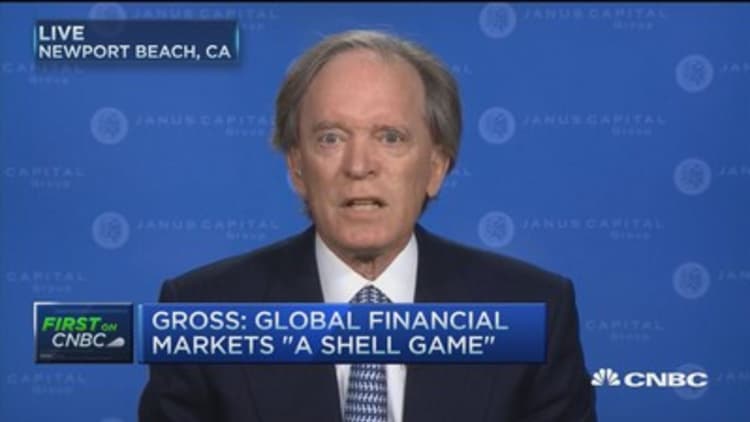
The global financial markets are a "shell game" thanks to government interventions like quantitative easing, and once the manipulation stops, the markets may drop, bond legend Bill Gross said Wednesday.
"This shell game has been taking place for a long time," the manager of the Janus Global Unconstrained Bond Fund said in an interview with CNBC's "Power Lunch."
He believes it's evidenced by what's happening in the Chinese stock market, with margins being changed and stocks being delisted.
"We see the same thing, basically, in all central banks in terms of their interest rates, in terms of quantitative easing from the ECB."
Gross first tweeted about it Wednesday morning.
"There's no doubt that the 'p,' in this case the price of assets, I suppose, is sort of a question mark, and ultimately when central banks stop manipulating markets, where that 'p' goes, I think, is up for grabs and probably the arrow points downward," Gross told CNBC.
His comments came shortly after the Federal Reserve said it was leaving interest rates unchanged. The central bank has kept its federal funds rate near zero since December 2008.
Read More Fed leaves interest rates unchanged
However, just because the markets are a "shell game" doesn't mean there isn't opportunity, Gross said. Instead of taking risk positions in terms of high-yield spreads or interest rates in long bonds or currency, investors can move in the opposite direction, like owning the yen instead of the dollar or the peso instead of the euro, he explained.
"There are choices and there are interest rates and prices that are relatively high and some relatively low. So that's the opportunity," he said.
Meanwhile, while Gross still believes the Chinese market may be a great short, he thinks the market is a difficult one to play.
Read More China stock crash will hit economy: Credit Suisse
He would look to move in currency markets and against high-yield markets.
"You take advantage of the increase in risk atmosphere that a declining Chinese stock market portrays. So it's not necessary to short the Chinese stock market. As a matter of fact, it's very dangerous."


